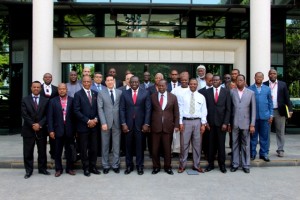ECOWAS calls for collective ownership of the Sahel strategy
The Economic Community of West African Stats (ECOWAS) has called for greater efforts towards ensuring common ownership of the Sahel strategy meant to consolidate on regional responses to long-term development and stability challenges of Sahel-Saharan zone.
Speaking at the opening of the meeting of the Technical Secretariat of the ECOWAS Sahel Strategy on the 9th of November 2015 at the ECOWAS Commission in Abuja, the ECOWAS Commissioner for Macroeconomic Policy Dr. Ibrahim Bocar Ba said the strategy would be most functional if it has a collective ownership both in precept and in practice.
Under the aegis of ECOWAS, countries of the Sahel-Saharan countries (Algeria, Morocco, Mauritania, Libya and Chad) are collaborating with member states of Mali and Niger with support of development partners to collectively tackle insecurity and instability.
The strategy encompassing 31 major projects to be implemented from 2016 to2020, has been put together at a cost of $4.7 billion. It has 14 priority areas amongst which are Interconnection of infrastructure, Resilience & Food Security, Education as well as Large-scale projects in peace and security support measures.
Welcoming the experts drawn from the stake-holding countries, relevant bodies and ECOWAS Institutions, Commissioner Ba thanked them profusely for keeping faith in the strategy and improving its work format. He remarked that the strategy remains the common instrument of all stakeholders towards achieving the goal of collective peace and sustainable development in the region.
Commissioner Ba maintained that the work programme for the meeting was drawn up in a manner that covers all the areas envisaged for maximum results because the countries now working together to realise the objectives of the strategy are experiencing the same security and development challenges. This he noted has necessitated working together at the regional level just as the core of the strategy remains the attainment of coherence at all times.
Reviewing the status of implementation during the meeting, presentations were made on the overall action plan of the Sahel strategy, the financing of the strategy and general progress report. Other presentations included those on the institutional framework, existing coordination mechanisms in the Sahel contributions as well as on Action Groups.
Some of the issues discussed during the technical and plenary sessions of the meetings were the collective curtailment of the widening ravages of terrorism and cross-border insurgency to ensure that terrorists and their sympathises do not find safe heavens in any country in the Sahel or their neighbours.
Among the officials at the meeting were the representative for the AU Mission in Mali and the Sahel (MISAHEL) Dr. Issaka Souare, the Special representative of the Club Sahel Somdat Yeaudatien, the Verification expert from G5 Sahel Mahamadu Samake as well as the ECOWAS Coordinator Community Development Programme (CDP) of Macroeconomic Policy and Research Department Dr. Guevera Yao as well as representatives of the Maghreb countries in the Sehel-Saharan zone led by head of delegation from the Moroccan Ministry of Foreign Affairs Youssef Slaout.
ECOWAS initiated the formulation of a strategy for the Sahel region on the basis of the Decision of the 43rd Ordinary Session of the Authority of Heads of State and Government of ECOWAS, held on the 17th and 18th of July 2013 in Abuja, Nigeria.
|




